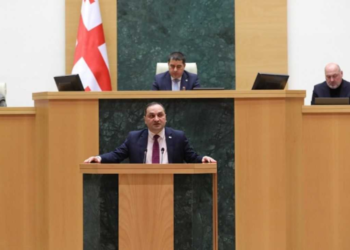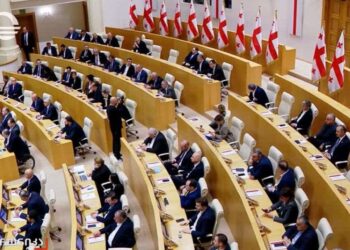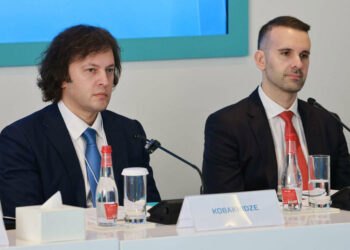US Senate Democrats on November 7 blocked a Republican effort to win quick approval for a bill providing emergency aid to Israel that passed the House of Representatives last week but which provides no assistance for Ukraine’s war against Russia.
The Democrats stressed the importance of providing aid to Ukraine as well as Israel, in addition to humanitarian aid, border security funding and money to push back against China in the Indo-Pacific that was in a $106 billion funding request President Joe Biden sent to Congress last month.
Pitching hard for aid to Ukraine, State Department officials told the Senate Foreign Affairs Committee that failing to support Ukraine would help Russia and undermine US credibility worldwide.
“It’s clear President [Vladimir] Putin is now playing a waiting game,” said James O’Brien, Assistant Secretary of State for European and Eurasian Affairs on November 8. “He thinks if he can wait for our elections, or for Ukraine to get tired, Russia can prevail.”
Asked about a future off-ramp to war in Ukraine, O’Brien said negotiation is inevitable.
“All wars end with a negotiation,” he said. “We’ve made clear we’ll do that with Ukraine, [and] not [go] over Ukraine’s head. “It takes two parties to negotiate the end of a war. President Putin is not serious about negotiating. He has said he wants to wait and see what happens in November ’24, after the US presidential election.”
NATO allies condemn Russia’s withdrawal from CFE treaty, will suspend its operation
NATO allies on Tuesday condemned a decision by Russia to withdraw from the Treaty on Conventional Armed Forces in Europe, which was a key post-Cold War treaty, adding that, as a consequence, they intended to suspend the operation of the treaty as long as necessary.
“Allies condemn Russia’s decision to withdraw from the Treaty on Conventional Armed Forces in Europe (CFE), and its war of aggression against Ukraine, which is contrary to the Treaty’s objectives. Russia’s withdrawal is the latest in a series of actions that systematically undermines Euro-Atlantic security,” said NATO in a statement.
“Therefore, as a consequence, Allied States Parties intend to suspend the operation of the CFE Treaty for as long as necessary, in accordance with their rights under international law. This is a decision fully supported by all NATO Allies.”
Earlier on Tuesday, Russia formally withdrew from this landmark security treaty which limited key categories of conventional armed forces, blaming the United States for undermining post-Cold War security with the enlargement of the NATO military alliance.
Ukraine’s attacks on Crimean shipyards could prompt Russia to consider relocation, UK says
Ukraine’s “capability to hit” shipbuilding infrastructure in Russian-occupied Crimea will likely prompt Russia to consider relocating such infrastructure further away, delaying the delivery of new vessels, the UK’s Ministry of Defense said Tuesday.
Ukrainian and Russian sources both reported on November 4 that a newly built Russian naval corvette was almost certainly damaged after being struck while alongside at the Zaliv shipyard in Kerch, in occupied Crimea.
“The Karakurst-class Askold, launched in 2021, had not been commissioned into the Russian Navy. The incident is farther to the east in Crimea than most previous Ukrainian-claimed long-range strikes,” the ministry said in an intelligence update on X, formerly known as Twitter.
“Ukraine’s capability to hit Crimean shipbuilding infrastructure will likely cause Russia to consider relocating farther from the front line, delaying the delivery of new vessels,” the UK said.
Russia says it has destroyed multiple drones over Crimea
Russia’s Defense Ministry said Tuesday that it has destroyed multiple drones over Crimea, the Ukrainian peninsula it has occupied since 2014.
“On the morning of November 7, an attempt by the Kyiv regime to carry out a terrorist attack using seventeen aircraft-type UAVs on objects on the territory of the Russian Federation was stopped,” the ministry said on Telegram. A UAV is an unmanned aerial vehicle, or drone.
“Duty air defense systems destroyed nine Ukrainian unmanned aerial vehicles and intercepted eight over the Black Sea and the territory of the Republic of Crimea,” it added.
Ukraine has not publicly commented on the alleged attack.
The war between Russia and Ukraine has been typified by the use of drone warfare. Drones continue to be vital weapons for both sides, used as both explosive devices and for surveillance and reconnaissance.
Ukraine confirms 19 dead after Russian strike on awards ceremony
Ukraine’s 128th separate Transcarpathian Mountain Assault Brigade confirmed Monday that 19 of its soldiers died in a Russian strike on an awards ceremony last Friday.
“The missile attack by an insidious enemy took the lives of 19 fighters of the 128th separate mountain assault brigade,” it said on Facebook.
“Now, a thorough check of all the circumstances of the tragedy is being conducted. Until it is completed, we call you not to spread unverified, fake information.”
“Our best fighters have died… We express our sincere condolences to their relatives and promise to pay back 100 times more for our brothers,” the post concluded.
The deaths have stoked public anger given that Russia attacked the brigade during an awards ceremony, an event that was seen as an easy target.
Ukraine’s President Volodymyr Zelensky took the unusual step of addressing the incident and losses in his nightly address on Sunday, admitting that the “tragedy could have been avoided.”
‘Wet from head to toe’: Russian morale reportedly dropping as weather changes
Eyewitness accounts from deployed Russian troops in Ukraine suggest that the soldiers’ battle against the elements remains a major preoccupation for Russia’s army, Britain’s Ministry of Defense said Sunday.
In an intelligence update on X, the ministry said Russian soldiers who had recently returned from Ukraine, speaking at the Ogakov Readings military affairs conference in Moscow on November 1, described being “wet from head to toe” for weeks on end on the front line.
“One soldier highlighted that the risk of fire alerting Ukrainian forces meant that they ‘couldn’t even boil a mug of tea.’ They spoke of living and eating ‘monotonous’ food in pervasive mud,” the UK noted.
Maintaining a decent level of personal comfort and sound administration in defensive positions is challenging for any army, the ministry noted, “however, open-source evidence suggests a generally very poor level on enforcement of basic field administration amongst Russian forces.”
“This is likely partially caused by a deficit in motivated junior commanders as well as variable logistical support.”
Compiled by Ana Dumbadze














